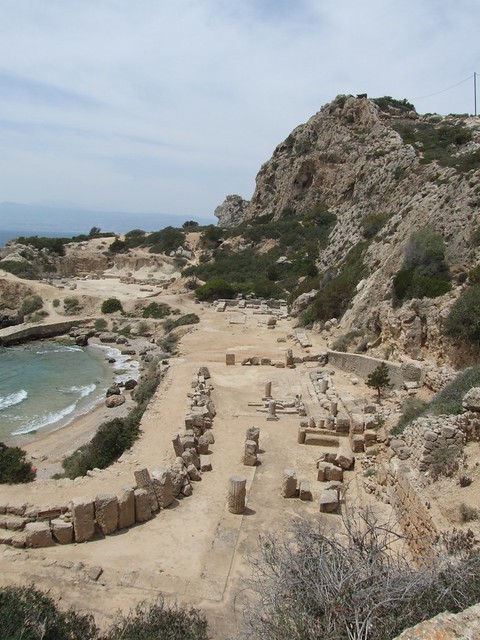 |
| Corinth today. |
1st Letter of Paul to the Corinthians
Two of Paul’s letters that sometimes feel like he could be writing to me are his epistles to Corinth, an ancient city that received what are called 1st and 2nd Corinthians in the Bible. Corinth was located between Athens and Sparta on a narrow strip of land and was very important in ancient Greece and in Rome. It was such a wealthy city, that there was an ancient expression: “Well, not everyone can go to Corinth.” Paul visited there twice, once for 18 months and once for 3 months. He wrote these letters around the year 55 AD.
All passages today are from the book 1st Corinthians, so we just give chapter and verse.
1:17-25 For Christ did not send me to baptize, but to preach the gospel—not with wisdom and eloquence, lest the cross of Christ be emptied of its power. For the message of the cross is foolishness to those who are perishing, but to us who are being saved it is the power of God. For it is written: “I will destroy the wisdom of the wise; the intelligence of the intelligent I will frustrate.” [Isaiah 29:14]
Where is the wise person? Where is the teacher of the law? Where is the philosopher of this age? Has not God made foolish the wisdom of the world? For since in the wisdom of God the world through its wisdom did not know him, God was pleased through the foolishness of what was preached to save those who believe. Jews demand signs and Greeks look for wisdom, but we preach Christ crucified: a stumbling block to Jews and foolishness to Gentiles, but to those whom God has called, both Jews and Greeks, Christ the power of God and the wisdom of God. For the foolishness of God is wiser than human wisdom, and the weakness of God is stronger than human strength.
1) Is God ever foolish? How can God’s foolishness be wiser than our wisdom?
2:10-16 The Spirit searches all things, even the deep things of God. For who knows a person’s thoughts except their own spirit within them? In the same way no one knows the thoughts of God except the Spirit of God. What we have received is not the spirit of the world, but the Spirit who is from God, so that we may understand what God has freely given us. This is what we speak, not in words taught us by human wisdom but in words taught by the Spirit, explaining spiritual realities with Spirit-taught words. The person without the Spirit does not accept the things that come from the Spirit of God but considers them foolishness, and cannot understand them because they are discerned only through the Spirit. The person with the Spirit makes judgments about all things, but such a person is not subject to merely human judgments, for, “Who has known the mind of the Lord so as to instruct him?” [Isaiah 40:13] But we have the mind of Christ.
2) This is one of the most direct teachings about the Holy Spirit in the whole Bible. What does the Holy Spirit do for us? What does not having the Holy Spirit make hard for other people?
6:12 “I have the right to do anything,” you say-but not everything is beneficial. “I have the right to do anything”-but I will not be mastered by anything. … 19-20 Do you not know that your bodies are temples of the Holy Spirit, who is in you, whom you have received from God? You are not your own; you were bought at a price. Therefore honor God with your bodies.
3) This is one of the big tensions in a Christian life. We’re forgiven, completely. So we’re free. Then why can’t we do anything? What does Paul say about that here?
8:9 Be careful, however, that the exercise of your rights does not become a stumbling block to the weak. … 13 Therefore, if what I eat causes my brother or sister to fall into sin, I will never eat meat again, so that I will not cause them to fall.
4) Is there anything that you’re free to do that someone else might get in trouble for doing?
Paul makes another analogy for how a Christian should lead their life:
9:24-27 Do you not know that in a race all the runners run, but only one gets the prize? Run in such a way as to get the prize. Everyone who competes in the games goes into strict training. They do it to get a crown that will not last, but we do it to get a crown that will last forever. Therefore I do not run like someone running aimlessly; I do not fight like a boxer beating the air. No, I strike a blow to my body and make it my slave so that after I have preached to others, I myself will not be disqualified for the prize.
5) Winning? What does winning have to do with living like a Christian? What is Paul trying to say?
The Corinthians were having weird problems with communion. Doing it in different ways, some people eating it as a full meal, etc. So Paul makes it simple:
11:23-29 For I received from the Lord what I also passed on to you: The Lord Jesus, on the night he was betrayed, took bread, and when he had given thanks, he broke it and said, “This is my body, which is for you; do this in remembrance of me.” In the same way, after supper he took the cup, saying, “This cup is the new covenant in my blood; do this, whenever you drink it, in remembrance of me.” For whenever you eat this bread and drink this cup, you proclaim the Lord’s death until he comes. So then, whoever eats the bread or drinks the cup of the Lord in an unworthy manner will be guilty of sinning against the body and blood of the Lord. Everyone ought to examine themselves before they eat of the bread and drink from the cup. For those who eat and drink without discerning the body of Christ eat and drink judgment on themselves.
6) So what is Paul’s bottom line about how we should take communion?
Chapter 12 is worth studying all by itself. It’s amazing in sharing how we all receive different gifts from God.
12:4-6 There are different kinds of gifts, but the same Spirit distributes them. There are different kinds of service, but the same Lord. There are different kinds of working, but in all of them and in everyone it is the same God at work.
12:8-11 To one there is given through the Spirit a message of wisdom, to another a message of knowledge by means of the same Spirit, to another faith by the same Spirit, to another gifts of healing by that one Spirit, to another miraculous powers, to another prophecy, to another distinguishing between spirits, to another speaking in different kinds of tongues, and to still another the interpretation of tongues. All these are the work of one and the same Spirit, and he distributes them to each one, just as he determines.
12:12 Just as a body, though one, has many parts, but all its many parts form one body, so it is with Christ…15-20 Now if the foot should say, “Because I am not a hand, I do not belong to the body,” it would not for that reason stop being part of the body. And if the ear should say, “Because I am not an eye, I do not belong to the body,” it would not for that reason stop being part of the body. If the whole body were an eye, where would the sense of hearing be? If the whole body were an ear, where would the sense of smell be? But in fact God has placed the parts in the body, every one of them, just as he wanted them to be. If they were all one part, where would the body be? As it is, there are many parts, but one body.
7) Paul makes it so clear that we are all supposed to be ourselves, to be different. Why is there so much pressure to all be alike? To be the same?
13:1-4 If I speak in the tongues of men or of angels, but do not have love, I am only a resounding gong or a clanging cymbal. If I have the gift of prophecy and can fathom all mysteries and all knowledge, and if I have a faith that can move mountains, but do not have love, I am nothing. If I give all I possess to the poor and give over my body to hardship that I may boast, but do not have love, I gain nothing. Love is patient, love is kind. It does not envy, it does not boast, it is not proud. … 11-13 When I was a child, I talked like a child, I thought like a child, I reasoned like a child. When I became a man, I put the ways of childhood behind me. For now we see only a reflection as in a mirror; then we shall see face to face. Now I know in part; then I shall know fully, even as I am fully known. And now these three remain: faith, hope and love. But the greatest of these is love.
8) In other words, it’s not enough to do good things. Why you do them matters. Why would God care about why we do what we do, as long as we’re doing good stuff?
15:3-5 For what I received I passed on to you as of first importance: that Christ died for our sins according to the Scriptures, that he was buried, that he was raised on the third day according to the Scriptures, 5 and that he appeared to Cephas, and then to the Twelve. …12-14 But if it is preached that Christ has been raised from the dead, how can some of you say that there is no resurrection of the dead? If there is no resurrection of the dead, then not even Christ has been raised. … 19-22 If only for this life we have hope in Christ, we are of all people most to be pitied. But Christ has indeed been raised from the dead, the first fruits of those who have fallen asleep. For since death came through a man, the resurrection of the dead comes also through a man. For as in Adam all die, so in Christ all will be made alive.
15:51-52 Listen, I tell you a mystery: We will not all sleep, but we will all be changed – in a flash, in the twinkling of an eye, at the last trumpet. For the trumpet will sound, the dead will be raised imperishable, and we will be changed. … 54-57 then the saying that is written will come true: “Death has been swallowed up in victory.” [Isaiah 25:8] “Where, O death, is your victory? Where, O death, is your sting?” [Hosea 13:14] The sting of death is sin, and the power of sin is the law. But thanks be to God! He gives us the victory through our Lord Jesus Christ.
9) Even if everything else is uncertain, this is what it comes down to for Paul. If someone asked you why you are a Christian, what is your bottom line?
Photos (@Flickr) PureOnsense, WordRidden





